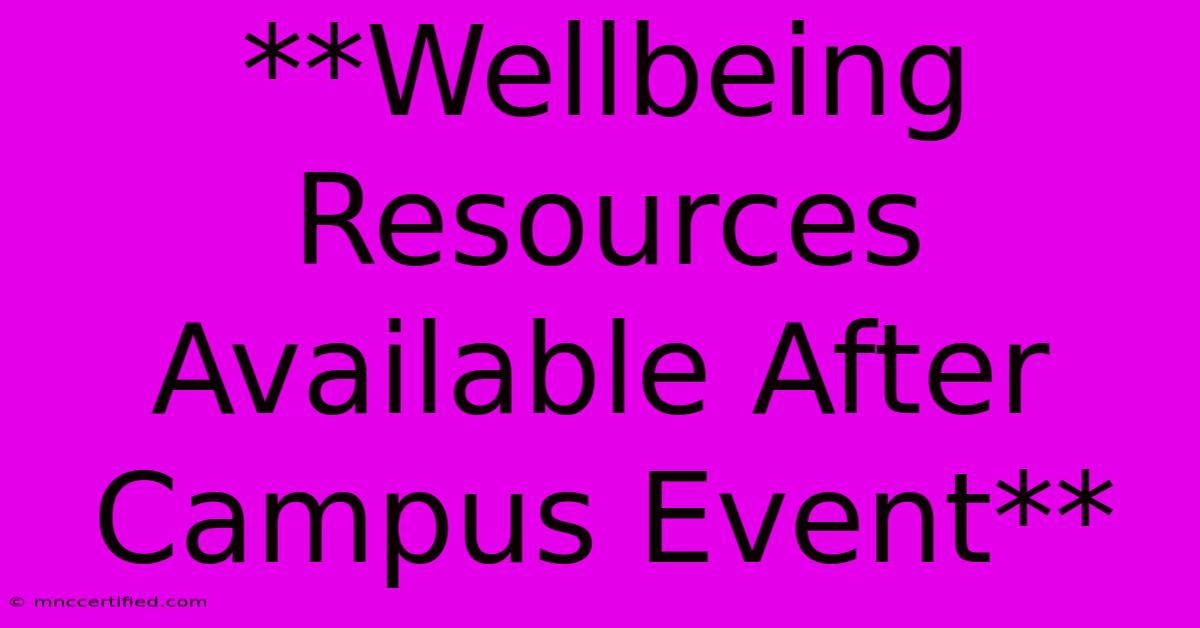**Wellbeing Resources Available After Campus Event**

Table of Contents
Wellbeing Resources Available After Campus Event: Prioritizing Your Mental Health
College life is a whirlwind of exciting experiences, but it also comes with its fair share of stress and challenges. Whether you've just attended a big campus event, a demanding exam period, or even a social gathering, it's important to prioritize your wellbeing after the event.
This article will highlight valuable resources available to support your mental and emotional health, helping you navigate the post-event period with greater ease.
Recognizing the Impact of Events
Campus events, while enjoyable, can significantly impact your emotional state. Even positive experiences can leave you feeling drained, especially if they involve large crowds, intense activities, or emotional highs.
Here are some common post-event emotions you might experience:
- Exhaustion: The excitement and energy of an event can leave you feeling physically and mentally tired.
- Anxiety: Social events can trigger anxiety, especially if you're introverted or prone to social anxiety.
- Mood swings: Shifting from a high-energy environment back to your routine can lead to fluctuations in mood.
- Emotional overload: Events can be overwhelming, leaving you feeling emotionally saturated.
It's crucial to acknowledge these feelings and prioritize your wellbeing after any event.
Essential Resources for Post-Event Recovery
Your university offers a range of resources specifically designed to support your mental health and wellbeing. Don't hesitate to utilize these valuable services:
1. Counseling Services:
- Confidential Support: Your university counseling center provides confidential individual and group therapy sessions.
- Addressing Concerns: Counselors can help you process post-event emotions, develop coping strategies, and address underlying mental health concerns.
- Professional Guidance: They can provide guidance on managing stress, anxiety, and other challenges you might face.
2. Student Health Services:
- Physical Wellbeing: In addition to mental health support, student health services can address physical health concerns.
- Managing Stress: They can offer strategies for managing stress, including relaxation techniques, mindfulness exercises, and healthy lifestyle recommendations.
- Referrals: If needed, they can provide referrals to specialists in the community.
3. Peer Support Groups:
- Connect with Others: Joining peer support groups can be incredibly beneficial for connecting with others who understand your experiences.
- Shared Experiences: Groups provide a safe space to share feelings, learn from others, and build a sense of community.
- Support System: Having a support system outside of your immediate circle can be invaluable for post-event processing.
4. Campus Wellness Programs:
- Mindfulness Activities: Many universities offer mindfulness programs, workshops, and resources to promote relaxation and self-care.
- Yoga and Meditation: These practices can help reduce stress, improve focus, and promote emotional wellbeing.
- Fitness Programs: Engaging in physical activity can significantly boost your mood and energy levels.
5. Online Resources:
- Mental Health Apps: Several apps are available to help you manage stress, anxiety, and other mental health concerns.
- Online Support Groups: Join online forums or communities to connect with others who understand your experiences.
- Self-Help Resources: Numerous online resources offer tips, techniques, and information on mental health and wellbeing.
Tips for Prioritizing Your Wellbeing After an Event
- Self-Care: Schedule time for activities that bring you joy and relaxation.
- Rest: Prioritize sleep and ensure you get enough rest to recover from the event.
- Healthy Diet: Eat nutritious meals and stay hydrated to support your energy levels.
- Limit Social Media: Take a break from social media to avoid comparing yourself to others or feeling overwhelmed by post-event content.
- Reach Out: Don't be afraid to reach out to friends, family, or campus resources for support.
Remember: Prioritizing your wellbeing is not a sign of weakness; it's a sign of strength and self-awareness. By utilizing the resources available to you, you can navigate the post-event period with greater ease and resilience.

Thank you for visiting our website wich cover about **Wellbeing Resources Available After Campus Event**. We hope the information provided has been useful to you. Feel free to contact us if you have any questions or need further assistance. See you next time and dont miss to bookmark.
Featured Posts
-
Walzs Future Trumps Election And Minnesota
Nov 07, 2024
-
Bayern Vs Benfica Kickoff Game On
Nov 07, 2024
-
Estrella Roja Vs Fc Barcelona 2 5 Win
Nov 07, 2024
-
Election Updates Breed Behind In Sf
Nov 07, 2024
-
England Tour Of West Indies 3rd Odi
Nov 07, 2024